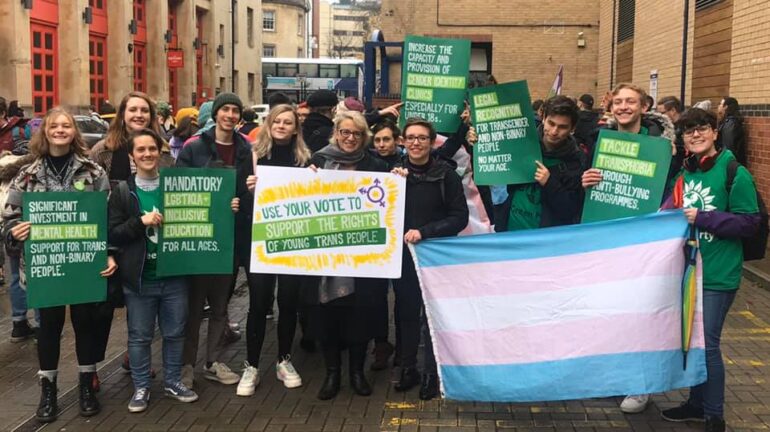Why I chose to tear Page 3 out of the Sun
Last Thursday, LSE Student Union voted to ban the sales of the Sun newspaper from Union shops. The vote was advertised across campus, and took place in a Union General Meeting (which all members of the union can attend). There were good points made on both sides – women’s liberty became central to the discussion, with Alice Stott’s view on sex workers and the class-basis of the motion being the most convincing against the motion.
 Despite a 64% vote for the motion and the subsequent banning of the newspaper, LSE SU Hayek Society decided to take it upon themselves to be the arbitrators of ‘free speech’ and gave away free copies of the Sun on Houghton Street – opposite the Student Union offices. After passing by their stall a couple of times and noticing the yet untouched pile of papers, I realised what the stall’s actual intention was.
Despite a 64% vote for the motion and the subsequent banning of the newspaper, LSE SU Hayek Society decided to take it upon themselves to be the arbitrators of ‘free speech’ and gave away free copies of the Sun on Houghton Street – opposite the Student Union offices. After passing by their stall a couple of times and noticing the yet untouched pile of papers, I realised what the stall’s actual intention was.
The Hayek Society didn’t expect that the papers would be taken. Nor did they really want to push the message of “free speech”. No, their intention was to actively antagonise everyone who voted for that motion, and more directly the Student Union itself. There was no reasoning possible. The only course of action was direct – and that, let me tell you, was terrifying.
I tore page 3 out of the Sun because those women had a right to wear whatever they wanted without a newspaper using their bodies to profit. Of course page 3 women have agency, and they have the choice to take their tops off and feature in a newspaper or not. However, there is a huge difference when you are being paid to do so, and when you are not. And it is precisely Alice Stott’s point about class that I want to address in my reasoning behind ripping out page 3.
The concept of “free” choice?
In postcolonial studies, the theorist Gayatri Spivak argues that because of the poorest (subaltern) have such limited ability to speak the language of the oppressors their voice cannot be heard, or indeed will not be heard. This is a line that can very much be taken in the context of a patriarchal and class-based society, where the silenced are the poorest women. It is not that their voices are not heard, but that they are misconstrued.
Giving the example of the Hope not Hate campaign where activists discussed how it was not immigrant groups that were the source of inequality, but the nature of the economic state, the number of voters who voted for the BNP plummeted. Individual decisions were changed by empowering some of the most vulnerable people to think outside of fear-based arguments and analyse the structures of oppression more clearly.
A similar argument can be made for page 3 women. Given that the Sun is the most read newspaper in the UK, specifically in working class communities, getting yourself on page 3 is like gaining celebrity status and a bit of cash in hand too! Furthermore, given the gender pay gap, female unemployment at an all time high, and no real prospects of that improving, women in poverty is only rising. Given these circumstances the Sun has the perfect opportunity to take advantage and easily convince women to pose for them.
I am not arguing that there is no agency, nor am I asserting that the women on page 3 are victims, but they also have the right to be seen as any man does – as a human first. I am arguing that their “free” choice isn’t always as free as it may seem because we live in an economic system that continues to disadvantage women.
The so-called battle for “free” speech
If it were my choice, the Express would have been the first paper to be sliced off the university’s procurement. Over and over again, I have seen myself victimised across its front pages – “1 in 5 British is Ethnic” is my personal favourite. However, the momentum against the anti-immigrant movement hasn’t started yet. The campaign against Page 3 has.
Every successful campaign needs to act at the right point. Jump the gun, and you won’t start a movement, you’ll only be ignored. The decision to ban the Sun by LSE SU was directly in tune with the growth of the no more page 3 campaign. If anyone had not heard of the campaign, Alex Peters-Day, General Secretary of LSE SU explained why the motion was presented clearly in her blog the previous day.
My end goal is not to see the Sun banned, but to see an end of female objectification. This is not a restriction of freedom of press as much as a strategy to convince the Sun to rethink their sexist attitude. And I go further to argue it to be reinstated at LSE SU shops once the objectionable material on page 3 is removed. This is a matter of women’s rights, just as boycotting South African goods during apartheid was a matter of the anti-racism.
Whatever the Hayek Society claim, my actions were done with the student body’s right to democratic procedure in sight. As many have known, the Hayek Society at LSE is well known for misogynistic campaigns, ones which have been called out before. When there are no options for negotiation because the other party is not interested, the only option is direct action. I can only hope that my actions conveyed that message clearly, and did not only end up supporting the Hayek Society’s claims of victimisation.
My call to LSE students is simple. We do need an end continual objectification of women. Boycott/Ban the Sun is one step forward. No more Page 3.



I’m with Lupus – banning a newspaper, however objectionable, just sets bad precedents. Of course everyone, including a student union, is free to decide how to spend its money and choosing not to buy a paper or offer it for sale needn’t be presented as a ban, just a stock-keeping or consumer choice or even simply a choice alongside one not to stock Nuts or Zoo because they don’t fit into the environment in an institution like the LSE. There are plenty of dodgy shops in Soho where studernts are free to buy that sort of material if they can’t find it on the internet. Simple. The last thing you want is to offer a rag like The Sun the chance to portray itself as a victim.
Well done. It warms my heart to see the Hayek Society complaining about ‘destruction of their private property’.
Boycott and ban are very different.
TV also has plenty of objectification of women and at times men, as do plenty of novels,music etc. Are you going to decide what I can read, watch, listen to etc?
Much as I admire your sentiments, you’re not. Boycott all you like but don’t decide for me – you’ll only alienate someone who largely agrees with you